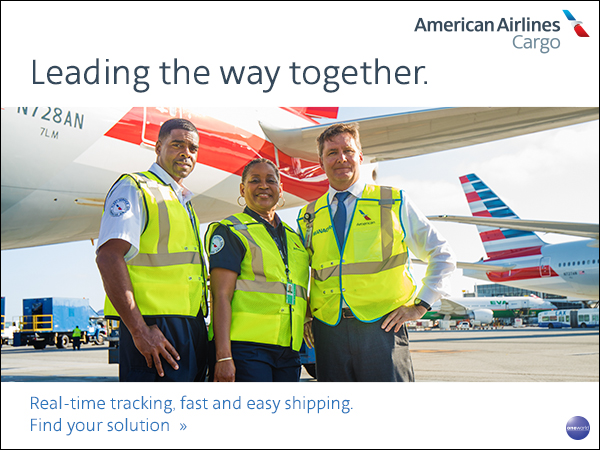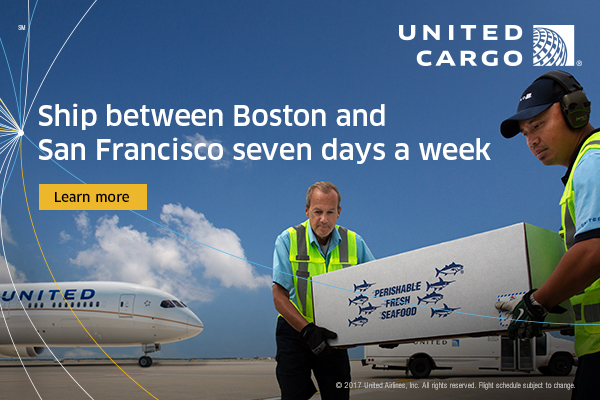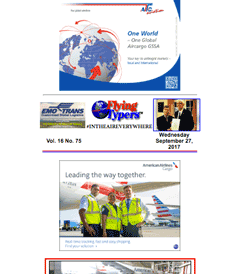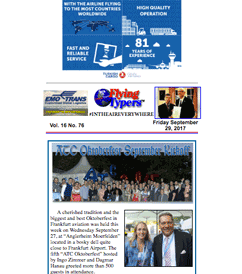
 |
 |
 #INTHEAIREVERYWHERE |
| Vol. 16 No. 78 | Wednesday
October 4, 2017 |
 |
 |
As long as man is
unable to beam a piece of freight from one end of the world to another,
the essence of knowledge and physical maneuvering is as important
as the technological application. Working Hand In Hand The two concepts go
hand in hand, exerting complementary pressure. Experience has shown
us that in any business cycle the organization must be agile. There
needs to be a focus on customer service, and lastly but equally crucial
is talent development. The Human Factor One final point on
this—the best & worst asset remains the human element. The Technology Burden
If the VFs rely purely on technology, the disruption will hit them
and wipe them out with one swoop. Ponder Yonder Brexit Another point to stress
is the real impact of Brexit. Credit Worth Applause The virtual forwarder
has indeed streamlined the processes and made “donkey work”
palatable. Traditional Forwarders Playbook We should make no
mistake, the traditional forwarder, if one does not embark on innovation,
will be wiped out.
|
 |
Did the peak season
start in August? One forwarder believes it did… The latest raft of air freight stats reaffirmed what most in the industry already knew—the summer of 2017 was a beauty. IATA recorded that air freight demand in July measured in freight ton kilometers (FTKs) increased by 11.4 percent year-on-year, the fourth time in five months that double-digit annual growth was recorded. Four Times Higher Than Norm Moreover, July's year-on-year increase in demand was nearly four times higher than the ten-year average growth rate of 3.1 percent. “Demand growth continues to significantly outstrip capacity growth, which is positive for airline yields and the industry's financial performance,” said IATA. “The robust growth in air cargo demand is consistent with an uptick in global trade, rising export orders, and upbeat business confidence indicators.” AAPA Word Up Healthy The Association of Asia Pacific Airlines’ August figures revealed a similarly healthy picture. The region’s carriers saw a 12.2 percent year-on-year increase in air cargo demand measured in FTKs, gains made possible by “firm demand for manufactured products, particularly pharmaceutical goods and technological equipment.” What Is Next? But where next? The view from forwarders interviewed by your correspondent in recent weeks revealed a clear consensus—volumes in September remained healthy and most expect demand to hold up through to the end of the year and, possibly, into 2018. Indeed, some suggest the peak season may in fact have started in August and demand could remain strong through to Chinese New Year next February. All That Glitters Is Not Gold However, one blip could come in the first week of October, when many factories in China will close for Golden Week. This could impact October’s figures. It is also worth noting that year-on-year gains might be less impressive in Q4 than thus far in 2017, but only because Q4 2016 saw a substantial surge in demand.
However, the overall
picture is one of a resurgent market starting to experience notable
pressure on capacity and prices. For example, according to the TAC
Index, on the Hong Kong-U.S. lane prices rose from USD $2.1 per kg
in February to USD $3.98 per kg on September 25. Taking A Bite From Apple He also said that while most of Apple’s new product launches had been flown direct from Chengzhou, the supply chain complexity of the product’s components had had a wider impact on capacity out of Asia and could further fuel demand in the weeks ahead. “We’ll be back to normal on October 9 after the holidays and I expect demand will drive up for some time depending on the sales of iPhone X,” he said. “The iPhone 8 should not influence the market so much, I don’t think.”
Ingo Rahn Brings It On
|
 |
“Bodacious”
Jim Bellinder, United Cargo’s VP Sales Americas, is in the news
this week. “Live With Five” is a breezy but thoughtful
set of answers to five questions about the “Billion Dollar Baby”
that is United Worldwide Cargo today. “Customer service
is always our top priority, of course, and the latest development
is United Cargo’s initiative to be more customer-focused in
applying our resources. “We continue
to make great progress on the development of our cargo joint ventures
with Lufthansa and ANA. “United is a
great company, and what makes it great are the people that care about
our customers and each other. How are you handling the capacity gains? “We’re
gaining some capacity with the delivery of more 777-300 aircraft.
How are you thinking about tomorrow? “While we concentrate
on delivering on our current commitments, a substantial portion of
our energy is focused on envisioning the future of cargo. |
 |
If
You Missed Any Of The Previous 3 Issues Of FlyingTypers Access complete issue by clicking on issue icon or Access specific articles by clicking on article title |
||
 Vol. 16 No. 75 Leadership Where It Counts Chuckles for September 27, 2017 Changi Roars Back Cargo Awards Less Than Rewarding |
 Vol. 16 No. 76 ATC Oktoberfest September Kickoff Chuckles for September 29, 2017 Digital India—Great Expectations Online Air Cargo Bazaar Flight Of Fancy With Miss Lillian |
|
Publisher-Geoffrey
Arend • Managing Editor-Flossie Arend Film Editor-Ralph Arend • Special Assignments-Sabiha Arend, Emily Arend • Advertising Sales-Judy Miller |
|